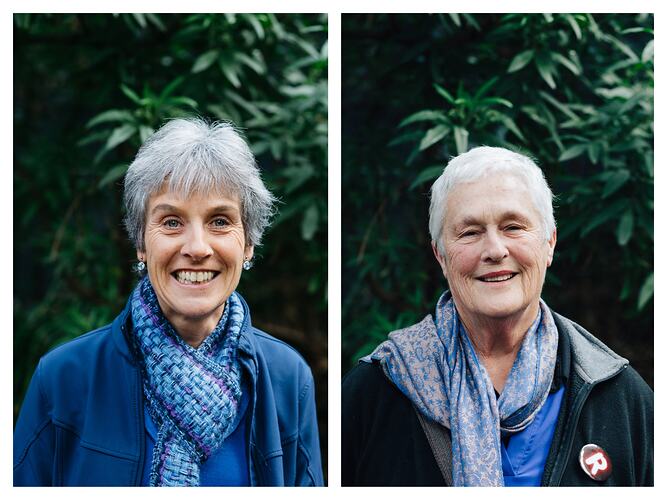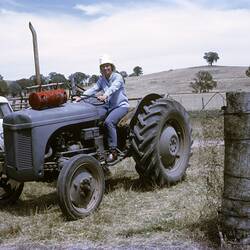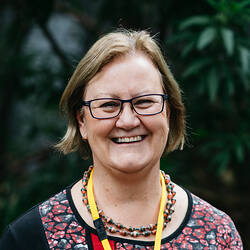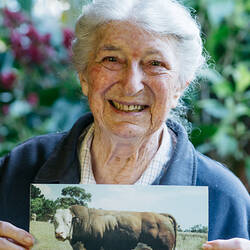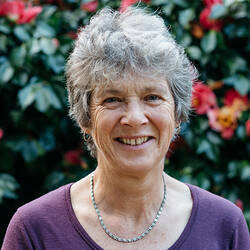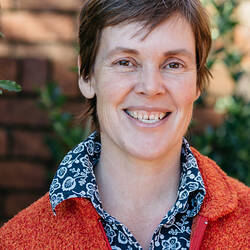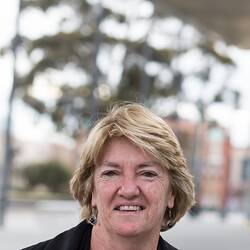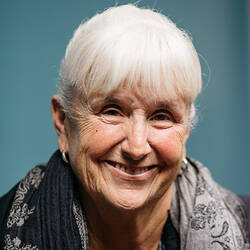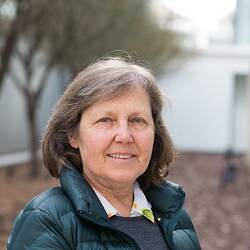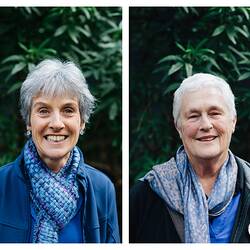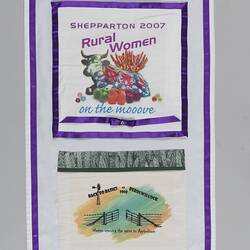Anna Lottkowitz and Jenni Mitchell were key figures involved in the Rural Women's Movement of the 1980s-1990s. They were appointed in 1986 to develop the Victorian state government's Rural Women's Network (RWN). The RWN played a pivotal role in facilitating rural women to develop a more active voice in government and decision-making, as well as encouraging rural women to network, lobby, share their stories and gain more recognition in public life. During their time with the RWN, Anna and Jenni worked alongside other prominent femocrats - such as the then-Premier Joan Kirner and MP Caroline Hogg - to expand the RWN across Victoria.
The following excerpts were taken from an interview with Anna Lottkowitz and Jenni Mitchell, recorded by Invisible Farmer Project Curator Catherine Forge at Melbourne Museum on 3 July 2015.
What do you remember about getting involved with the Rural Women's Network?
Anna Lottkowitz: For me I was working in the Seymour Office of the Department of Agriculture when the drought was hitting seriously up in the north-west of the state, and there had been some conversation about the ways in which government could address what was happening around rural social issues. So that's when I put my hand up for the job in the Rural Women's Network, and the rest is history. While the actual concept of the Rural Women's Network came substantially from the ALP (Australian Labor Party), it was really born out of necessity through the experience of drought, and from women, and this is where Joan Kirner's influence also stepped in.
Jenni Mitchell: By the time I had applied for a job in the Rural Women's Network I had a background in Neighbourhood Centres and Adult Learning Centres. I knew Joan Kirner, I knew Kay Setches and Margaret Ray, and a lot of those Labor women of the 1980s came from grassroots organisations. Joan Kirner by this stage had started looking at Landcare as the Minister for Conservation, talking to catchment areas and farmers about the care of the land. Her network was outstanding. So we're talking about the feminist movement now, and a lot of women power in the Cabinet which just made an extraordinary difference to the way people work. And the Women in Agriculture movement was also one of the things bringing the Rural Women's Network together - women were networking in the Wimmera, and in Gippsland, and doing farm skills courses because of the drought.
What was the most urgent and pressing thing that you needed to start working on when you joined the Rural Women's Network?
Jenni Mitchell: Well the first thing we did was get in the car, and we travelled. And we went to wherever we could get a meeting with rural women, whether it was the farm, the kitchen or an Adult Education Centre, and we developed five key priority areas.
Anna Lottkowitz: Drought was the beginning priority, then childcare, health, education and transport. And then the next thing that started to happen was the development of women's health services, with the government committed to women specific services, whether it was health or the growth of domestic violence outreach type services. We set up a Women's Enterprise forum in Melbourne and also did seventeen or eighteen rural workshops as well. We also established the NETWORK newsletter which became an information conduit that people could share, and people would write articles. What was extraordinary with this newsletter was that we, as government officers, were allowed to publish just about anything and if it was highly critical of government we could always get a response.
Tell us about the structure and aims of the Rural Women's Network.
Jenni Mitchell: Joan Kirner had a good relationship with rural communities because of her work with Landcare, and Heather Mitchell who was on the National Farmer's Federation - it was those two women I think, and those two crucial organisations, that allowed us to form a network. We weren't forming this network to be an organisation, but rather to support, give information and show people how the political system works.
Anna Lottkowitz: The language was very much focused on the fact that we were not a membership based organisation. The network was a network, not an organisation. There was also the question of defining who was a 'rural woman'. It had to be explained across the countryside that if you lived in a small town or a regional city, you were also a rural woman, so it was trying to get an understanding of the actual common ground that you have as a rural woman across very diverse sectors and interests and political ambitions.
A lot of the Rural Women's Movement was about getting increased recognition and visibility around rural women's issues. How important was this?
Anna Lottkowitz: I think it was quite critical in many ways because women were the unsung heroes. When crisis hits rural communities it's the women who often hold it together. We've seen that time and time again, especially on the emotional front. It's one thing for women to be recognised as farmers, but it's also important to recognise the diversity of other things that they do by their nature, and in their farming communities.
Jenni Mitchell: One thing that I recall of the 1990s and increasing rural women's visibility is the creation of the ABC awards that awarded women for their contributions to agriculture and rural life. These awards were vital in raising the profile of rural women.
How important do you feel that the history of the Rural Women's Network is?
Jenni Mitchell: I'd say it's vitally important because it has made a huge difference. And it made a difference in this state (Victoria), but it's been pushed along to other states with the creation of more rural women's networks. I don't think you can talk about women in agriculture and what they're doing now without talking about the beginnings of the movement in Victoria.
Anna Lottkowitz: And I think the Australian Rural Women's Movement led the world internationally. What happened in Australia was typically Australian, different, and radical, with the very strong intent around change. The change is what drove it. And there was kind of a necessity because of the Australian culture, and that's why it worked so well.
More Information
-
Keywords
Agriculture, Farming, Rural Women, Rural Industry, Rural Victoria, Women's Associations, Conservation, Sustainable Agriculture, Women's Movement, Gender Roles
-
Localities
-
Authors
-
Contributors
-
Article types
